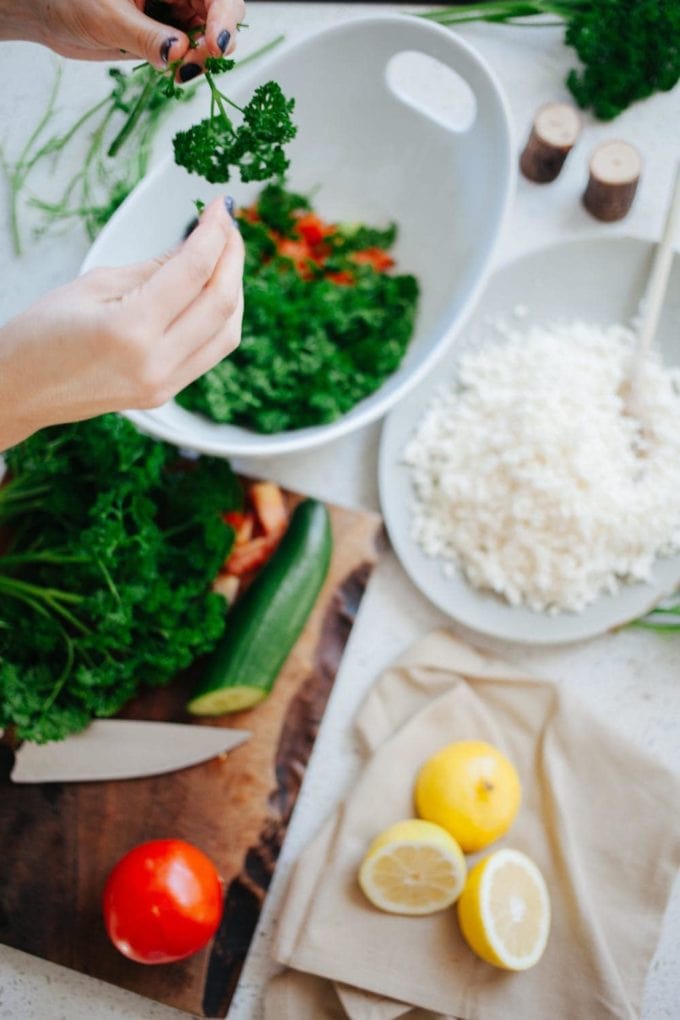What to eat, in your thirties

Life in your thirties is all about forward momentum. Many people start families just as their career is heating up. Maybe there’s a new home in your life in addition to a new child. Or you’re trying to pull 60 hour weeks while maintaining some semblance of a social life. Needless to say, your thirties is when you push.
I am smack dab in the middle of this decade myself so this post is feeling a little close to the belt. I started work as a dietitian at 29 and got pregnant with my son just after my 30th birthday. I became an entrepreneur when my son was two. Currently, I have a nine month old daughter and a business to run. So I feel like (am hoping?) this will be the most frenetic decade of my life. And I work really hard to take care of myself through it all. Although I don’t succeed 100% of the time.
Not surprisingly, this is the decade that can derail previous wellness efforts. If you are going to fall prey to convenience foods and take out, this is when it will happen. That gorgeous, nutritionally balanced lunch box you pack your kids? Prepared as you swill coffee and eat a packaged breakfast ‘biscuit’.
You are out of your bone building years so now the focus is on maintaining what you’ve built. Keeping up your calcium and vitamin D intake will ensure you aren’t robbing from your bone bank. So will managing chronic inflammation, which can hasten bone breakdown.
A busy life might mean you are more sedentary than before…and your usual meal pattern is leading to weight gain. Stress can compound this and leave a nice spare tire around your middle.
If you are preparing to start a family, you want to nurture your fertility now. A simple multivitamin is a good idea for women before they get pregnant as both iron and folate are important for a healthy pregnancy from day one. But men aren’t off the hook either: a healthier diet, high in fruits and vegetables and beneficial fats from seeds and fish is a good idea for future fathers too.
Building a Healthy Relationship with Food… and Your Body
Get into a routine
When life is crazy, it helps to put your self-care on autopilot. Schedule grocery shopping once a week and stick to it or have it delivered (you don’t have time for multiple trips to the store).
Go ahead, make the same healthy breakfast everyday. A smoothie (or avocado toast!) can really save your sanity in the morning.
Always wondering what you’ll make for dinner – or grabbing take out because you are too tired to make a decision? Try this:
- Grab an old school recipe card file. You know, the one your mom used to use before the internet.
- Every time you make a good meal that was quick and tasty, write the idea on a card. No need to labour over detailed recipe steps unless you think you need it.
- When you don’t know what to make and are tempted to pick up the phone to call for take out, grab a card from the file. Don’t go googling a hundred recipes on line because that will just overwhelm you.
- All you need is 10 good ideas to cycle through…you don’t want to have too many choices. Need a place to start? Try my pinterest board.
Anchor your plate with plants
Maintaining a healthy weight and keeping chronic inflammation at bay can be tough if you don’t set yourself some ground rules. One of the best/easiest? Make half your plate fruits and vegetables every time you eat. It’s that simple (but it takes effort!). If a recipe doesn’t have enough veggies, double them – or add a quick side salad. Look for veggie based meals (salads/stir-fries) when you eat out. Serve yourself more ‘side dishes’ and decrease your grain and protein a bit. No matter how you like to eat, this rule works.
Why do it? By upping your produce intake, you will fill up on more nutrient-dense (but not calorie-dense) food that will help regulate your appetite, your blood sugars and combat inflammation. A healthier you…without much effort.
Watch the caffeine
Loosen up the death grip on your coffee mug…I won’t take your (my) beloved java away. However, if you find you need more than two small cups a day, you might want to reconsider. Why? Because caffeine intake can leach calcium from your bones. Just a tiny bit…but if you aren’t keeping up your calcium intake, every tiny bit counts. Caffeine can also irritate a stressed out gut AND make it harder to sleep: it’s half life in the body is 6 hours, meaning that grande Americano you downed at noon is still 1/4 in your system at midnight. You can see where this is going…caffeine messes with what precious sleep you get, leaving you groggy the next day and reaching for more caffeine.
What is a small cup? A 250ml, one cup measure’s worth. Your tall coffee is two cups. Anything over and above that is likely too much. Switch to decaf the rest of the day. You probably won’t notice.
Get to Know Your Core Nutrient
Fat
Given the twin concerns of weight gain and inflammation in this decade, fat becomes an important nutrient to get right. Eat too much…it’s easier to gain weight. The wrong kind promotes inflammation. Get it right and your food will be more flavourful, you will satisfy your appetite, keep blood sugars in check, make your heart healthier, your skin brighter….the list goes on and on.
The easiest way to manage your fat intake is go light on added fats, like cooking oil and spreads. Instead, focus on whole food sources of fat such as avocado, olives, raw nuts and seeds. Whole foods are more filling than pure oils which will help to ensure you don’t overdo it. A quick drizzle of extra virgin olive oil in the pan is all you need for a healthy, more flavourful meal. Which brings me to the kind of fat to eat.
My number one, super star, A++ pick for an everyday oil is extra virgin olive oil. Any standard supermarket brand can be cooked and baked with. For frying, choose cooking-grade coconut oil or refined avocado oil. Ban margarine, seed oils like canola and sunflower, soy and corn oil. If you eat butter, save it for a special occasion. Opt for nut butters, tahini, hummus or tapenade on your sandwiches instead.
Ease up on animal sources of fat…but don’t go fat free. If you love dairy, eat full fat – just less of it. This may be particularly important if you are trying to conceive, based on some observational evidence. If you eat meat, downsize your portions and eat fish or poultry more often.
Eat These Super (Simple) Food Picks
Tahini
Tahini is sesame butter – you’ve probably eaten it in hummus but not known what to do with it. Well, tahini is one of my favourite tricks in my plant-centred tool kit for making things creamier. It is also super nutritious (sesame seeds? who knew?). Two tablespoons have 5 grams of protein and 40 mg of calcium calcium in addition to zinc, iron and magnesium.
Blend tahini into salad dressings or sauces where you want a super creamy texture (like my tri-seed risotto!). It goes beautifully in smoothies (trust me – with mango!) or for making cookies too.
Hemp seeds
You need to calm down already.
So take some hemp seeds and call me in the morning. Because you are too old to smoke pot.
It’s not what you might think…hemp won’t get you high. Instead, hemp seeds are high in magnesium, which helps relax your muscles. It is also important for rest: brain levels of magnesium rise in slumber. And we don’t get a lot of magnesium in our over-processed western diet. Hemp seeds are also high in protein (10g in 3 tbsp) and boast plenty of anti-inflammatory omega 3 fats. Including GLA which is a great fat for women’s health.
Want to make the most of your hemp? Eat at least 2-3 tbsp at a time. Just add hemp seeds to your morning yogurt/smoothie/cereal or your lunch salad/soup. It’s that easy.
Avocado
I will be sad when the avocado trend fades…because we will likely forget how good they are for us. High in heart-healthy monounsaturated fat, avocados are actually pretty high in fibre including soluble fibre which is easy on the gut. They are also rich in folate (but you still need that multi!) and anti-inflammatory (bone building!) vitamin K.
How to use it? Avocado toast, of course. Or puree into your morning smoothie, chop into salads or smash on sandwiches.
Common Nutrition-Related Health Concerns To Seek Help For
This is the time when things start to get chronic. If you are diagnosed with blood sugar issues, blood pressure concerns or high cholesterol, get thee to a dietitian now. Nutrition – particularly when you start early – can greatly improve these issues. Work with a registered dietitian to craft a healthy, whole foods eating plan that will keep a lifetime of medications at bay.



